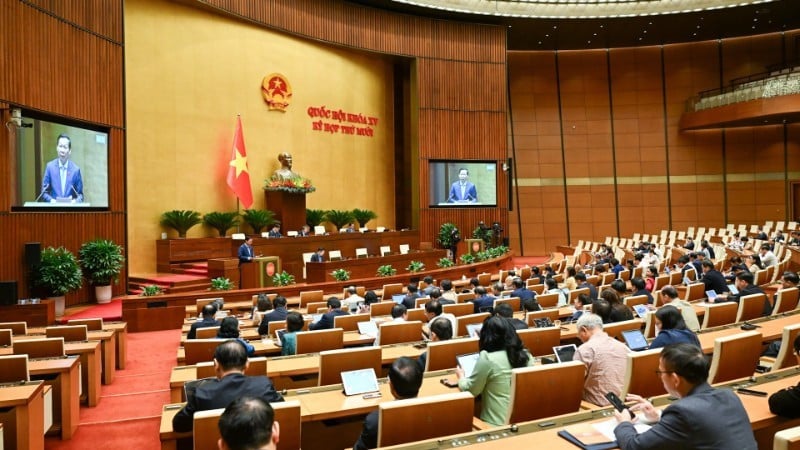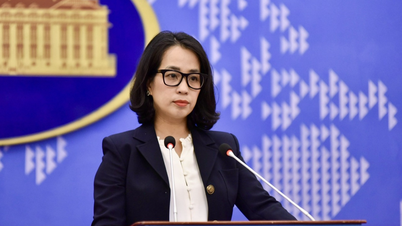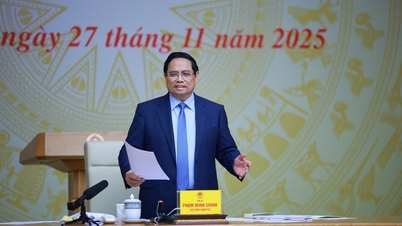
Regarding the causes, there are both problems from the donor side and problems related to domestic institutions, processes, and procedures, from negotiation to disbursement of ODA capital sources. For example, the current Law on Public Debt Management stipulates cumbersome processes and procedures for ODA capital, which must go through many ministries and branches, and then down to the local level; the procedures are twice as many as for public investment projects using domestic budget capital. In addition, there is the problem of implementation organization of localities: There is money but it cannot be disbursed, when the agreement expires, the donor is forced to withdraw it, which is very regrettable.
Currently, the important condition for deciding to borrow ODA capital is to ensure financial efficiency and only then will there be no worries about inflation and the burden of paying off national debt. Although borrowing is not at all costs, while the budget is still limited, this is an issue that needs special attention to ensure progress in arranging ODA loans and ensure good implementation, quickly putting resources into socio-economic development.
To remove obstacles, the draft law has promoted decentralization and delegation of power, especially decentralizing the authority to decide on the loan limit for re-lending and the annual guarantee limit from the Government to the Prime Minister, which helps simplify and shorten the approval process. The draft law also assigns the Ministry of Finance the authority to decide on amending, supplementing, and extending ODA loan agreements and preferential loans that do not increase the Government's foreign debt repayment obligations. This provision also creates flexibility in the implementation process and reduces administrative procedures...
However, in order to help the Government mobilize capital effectively in the coming time as well as ensure consistency in public debt management activities, a delegate proposed to add the principle of public debt management with the content "all debt obligations of the Government are treated equally". According to the delegate, this provision demonstrates the Government's commitment to the ability and responsibility to repay debt according to the principle of equal treatment, which is also one of the important criteria that international credit rating organizations use to assess a country's debt risk profile, so it is necessary to legalize this content into a principle.
On that basis, it is necessary to stipulate the responsibilities of relevant agencies in fully and promptly disclosing information on borrowed debt obligations, the situation of debt use and repayment so that relevant agencies can conveniently monitor and supervise the effective use of borrowed capital. It is necessary to stipulate to ensure publicity and transparency on special cases that may occur, how they will be prioritized for handling, for example, urgent debts to ensure national financial security, etc.
In addition, it is necessary to strengthen the role of the State Audit and agencies under the National Assembly in auditing and supervising the implementation of debt repayment obligations, ensuring compliance with the principle of equality between creditors; strengthen the capacity of public debt management staff, especially in negotiating and understanding international legal provisions to apply this principle flexibly and effectively; strengthen the management of fiscal risks arising from borrowing and re-lending activities, associated with the responsibilities of relevant parties.
According to the reflection of National Assembly delegates, the application of information technology and digital transformation in exchanging, appraising and approving documents to ensure time and cost savings is still limited. Notably, there are no regulations on the information system, data sharing on public debt between the central and local levels; debt calculation and debt repayment between management agencies are all done manually.
In order to manage public debt more effectively and meet the requirements of timely and accurate management, it is necessary to continue to consider and supplement regulations assigning the Ministry of Finance the responsibility to regulate a unified information system on public debt data between the Central, local and each unit such as exchanging data information, comparing capital withdrawals, debt repayments, etc.
Source: https://baosonla.vn/kinh-te/huy-dong-va-giai-ngan-von-oda-hieu-qua-ubAwMGZvR.html





![[Photo] President Luong Cuong attends the 50th Anniversary of Laos National Day](/_next/image?url=https%3A%2F%2Fvphoto.vietnam.vn%2Fthumb%2F1200x675%2Fvietnam%2Fresource%2FIMAGE%2F2025%2F11%2F27%2F1764225638930_ndo_br_1-jpg.webp&w=3840&q=75)
![[Photo] Prime Minister Pham Minh Chinh chairs the 15th meeting of the Central Emulation and Reward Council](/_next/image?url=https%3A%2F%2Fvphoto.vietnam.vn%2Fthumb%2F1200x675%2Fvietnam%2Fresource%2FIMAGE%2F2025%2F11%2F27%2F1764245150205_dsc-1922-jpg.webp&w=3840&q=75)










![[Photo series] Watching the sunset at Long Thanh Airport construction site](https://vphoto.vietnam.vn/thumb/402x226/vietnam/resource/IMAGE/2025/11/27/1764254151573_anh_5_20251127205055_20251127212613.jpeg)
















































































Comment (0)